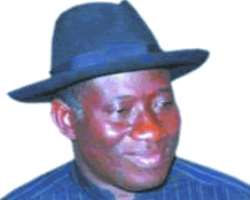JONATHAN'S NEW YEAR SHOCKER

With the take-off of deregulation of the downstream sector of the oil industry yesterday, Nigerians will now have to pay more for fuel. In fact, petrol may cost as much as N140 per litre. It was N65 on Saturday.
The Federal Government, by the policy, defied all criticisms by going ahead with its fuel subsidy removal effective from January 1, 2012.
It was President Goodluck Jonathan's New Year gift to Nigerians.
A statement issued yesterday by the Petroleum Products Pricing Regulatory Agency (PPPRA) announced the formal removal of the subsidy.
Reginald Stanley, Executive Secretary, PPPRA, in a statement said, the decision was in line with wide consultations with stakeholders across the nation.
The statement reads in part: 'Following extensive consultation with stakeholders across the nation, the Petroleum Products Pricing Regulatory Agency (PPPRA) wishes to inform all stakeholders of the commencement of formal removal of subsidy on Premium Motor Spirit (PMS), in accordance with the powers conferred on the agency by the law establishing it, in compliance with Section 7 of PPPRA Act, 2004'.
Stanley also announced the effective take-off of deregulation of the downstream sub-sector of petroleum industry as he also stated that fuel marketers who discharge products after January 1, 2012 will not be paid subsidy on fuel.
By this announcement, the PPPRA boss explained further that the downstream sub-sector of the petroleum industry is hereby deregulated for PMS (petrol). Service providers in the sector are now to procure products and sell same in accordance with the indicative benchmark price to be published fortnightly and posted on the PPPRA website.
'Petroleum products marketers are to note that no one will be paid subsidy on PMS discharges after 1st January, 2012.
'Consumers are assured of adequate supply of quality products at prices that are competitive and non-exploitative and so, there is no need for anyone to engage in panic buying or product hoarding.
Stanley stated that the PPPRA in conjunction with the Department of Petroleum Resources (DPR) will ensure that consumers are not taken advantage of in any form or in any way.
He said DPR will ensure that the interest of the consumer in terms of quality of products is guaranteed at all times and in line with international best practice. In the coming weeks, the PPPRA will engage stakeholders in further consultation to ensure the continuation of this exercise in a hitch-free manner. President Jonathan's pronouncement late last year that government will no longer pay for the difference on the cost of fuel importation by marketers has thrown the country and its citizens into a battle with the Federal Government.
The debate became hotter as more condemnations and criticisms trailed the planned policy as many described it as an unpopular one which is representing the interest of very few Nigerians. Since the President presented this year's budget of N4.749 trillion to the National Assembly on December 13, 2011, there was no provision for fuel subsidy. The development fuelled speculation that the government was bent on removing the subsidy. The Co-ordinating Minister for the Economy/Finance Minister, Dr. Ngozi Okonjo-Iweala, said the government was consulting more stakeholders before taking the action.
Also, her Information counterpart, Mr. Labaran Maku, in justifying why subsidy must eventually go, said the government had not decided on the take-off date. The President, had on December 15, 2011 during the Christmas carol service at the Villa in Abuja, assured that he would not be party to inflicting pains on Nigerians, but warned that the country cannot continue borrowing to fund the economy.
The human rights/community, organized Labour are up in arms with the government on the removal, threatening to make the country ungovernable. The National Assembly was yet to approve of Jonathan's request.
